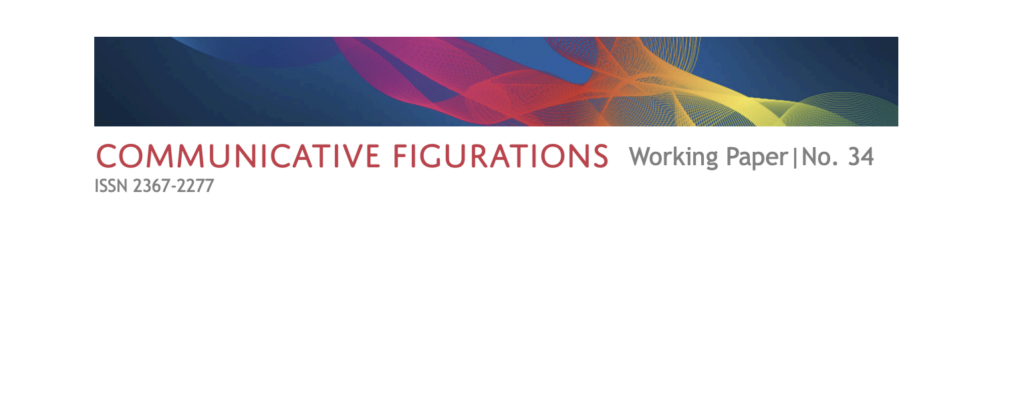
No. 34 - Florian Hohmann, Alessandro Belli and Andreas Hepp: Manual for media diary software: MeTag Analyze & MeTag App
Media diaries are an established method in media and communication research and as a methodical approach can be applied to a wide variety of different research purposes. They can be used to research time budgets allocated to particular media, patterns of interpersonal media communication and many other purposes (see Gershuny & Sullivan 1998, Jäckel & Wollscheid 2006, Linke 2010 or Berg & Düvel 2012). Media diaries can also be a pedagogical tool in media education (Berg 2019; Hyers 2018), e.g. to make someone aware of their media use. They are furthermore an appropriate tool for reconstructing the use of media from a procedural perspective, i.e., to show how media practices occur and develop over time, be it over a day, over a week or over a month, etc. Due to this orientation towards capturing passages of time, media diaries are also an established method to research media repertoires from a processual perspective (Hepp et al. 2016).
However, there are practical limits to this potential in principle: While diaries can be, and traditionally are, done via pen and paper, they pose certain challenges for data collection: they demand a high level of engagement from participants, creating entries can be time consuming. Less literate participants (e.g. children) are hesitant to fill them out sufficiently or at all. The response rate is typically rather low and the collected data can be unstructured which complicates comparable analysis. One way to remedy the mentioned shortcomings is the use of digital diaries. While some studies rely on the use of programs like WhatsApp to collect diary-like data (Kaufmann & Peil 2020), there is also research software dedicated to digital media diaries. One such example is the program MeTag (Hohmann 2021), whose functionalities are being described in detail in this manual. In addition to simplifying data collection by a smartphone app, it also offers a backend for process-oriented data analysis that can help to recognize process patterns of media use through visualisation. And with the different purposes outlined above in mind, MeTag is built to support various kinds of research, ranging from standardized to non-standardized data collection.
The purpose of MeTag Analyze and the accompanying MeTag app (which can be found in the app stores of Apple for iOS and Google for Android) is to provide researchers with a tool to collect and analyse media diaries. The data collection takes place via the above mentioned MeTag app on the participants’ smartphones. The data analysis is done via a web-based back-end app called MeTag Analyze which at the same time functions to start and end data collection projects.
About the authors
Florian Hohmann
Florian Hohmann, M.A. is Assistant Researcher at the the ZeMKI, Centre for Media, Communication and Information Research. He works in the DFG-funded project “The sustainable provision of software for cross-media practices and digital traces research – A ‘co-creation approach’ for developing an infrastructure model for the digital diary and sorting apps MeTag and MeSort”.
Alessandro Belli
Alessandro Belli, M.A. is Assistant Researcher at the the ZeMKI, Centre for Media, Communication and Information Research. He works in the DFG-funded project “The sustainable provision of software for cross-media practices and digital traces research – A ‘co-creation approach’ for developing an infrastructure model for the digital diary and sorting apps MeTag and MeSort”.
Andreas Hepp
Andreas Hepp is Professor of Media and Communication Studies with the special areas Media Culture and Communication Theory at the ZeMKI, Centre for Media, Communication and Information Research. Hepp graduated 1995 from the University of Trier with an MA-degree in German Studies and Political Science, focusing on media communication. Between 1995 and 1997 he was a research associate in the interdisciplinary research project “Talking about Television. The Everyday Appropriation of TV“ at the University of Trier (funded by the Deutsche Forschungsgemeinschaft, DFG). In 1997 he finished his doctoral thesis on everyday appropriation of television, combining various perspectives of Cultural Studies with sociological conversation analysis. After having done some post-doctoral research at the University of Trier, Andreas Hepp was a lecturer at the Interfaculty Institute for Applied Cultural Studies at the University of Karlsruhe (TH) in 1999. Between 1999 and 2003 he worked as a research associate at first, and later on as an academic assistant (wissenschaftlicher Assistent) at the Institute for Media and Communication Studies at the Technical University of Ilmenau. During that time he was also a research fellow at the Nottingham Trent University, UK, and a visiting researcher at the University of Sunderland, UK. In 2004 he finished his habilitation thesis on media cultures and globalisation. In 2003 and 2004 he was a deputy professor of media sociology and media psychology at the University of Muenster. From 2005 to 2010 he was professor of communications at the faculty for cultural studies, University of Bremen.

